There were some great films which largely benefitted from being seen on the big screen, once again, making a case for theater viewing experience that it still has a place in cinema discourse. Pacifiction, Decision to Leave, Tár, Moonage Daydream all excelled in larger format cinema experience.
*Petite maman, Wheel of Fortune and Fantasy, Tsugua Diaries, In Front of your Face, Neptune Frost all made last years list.
1. Pacifiction - Serra
 A grand, most intoxicating cinematic experience in recent memory, Pacifiction stood far above anything else I'd seen this year. Its invisible enemies and wildly outdated Cold War paranoia of the first world suits Serra's cynical, comic take on the impotence of the former colonizers whose meaningless posturing and silly power games is spot on. This is our generation's Dr. Strangelove.
A grand, most intoxicating cinematic experience in recent memory, Pacifiction stood far above anything else I'd seen this year. Its invisible enemies and wildly outdated Cold War paranoia of the first world suits Serra's cynical, comic take on the impotence of the former colonizers whose meaningless posturing and silly power games is spot on. This is our generation's Dr. Strangelove.
2. Aftersun - Wells
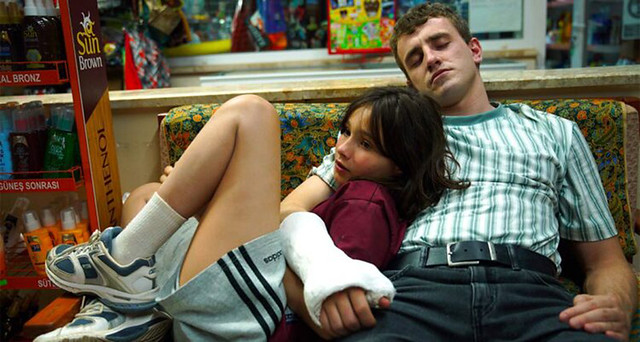 Memories are subjective and selective. They also make us who we are. Charlotte Wells's poignant film about the memories of a young woman about her absent father shows us the fragility of our construction of self. Aftersun is a melancholic, futile attempt at reconciling the facts with our embellished and suppressed memories. It nearly broke me.
Memories are subjective and selective. They also make us who we are. Charlotte Wells's poignant film about the memories of a young woman about her absent father shows us the fragility of our construction of self. Aftersun is a melancholic, futile attempt at reconciling the facts with our embellished and suppressed memories. It nearly broke me.3. Decision to Leave - Park
 Not as bombastic or fantastical as his previous films, but Park's Decision to Leave is any less brilliant in its intricacy and execution. Its down to earth tone and Tang Wei and Park Hae-il's empathetic performances resonate emotionally more than any of his films. A supreme entertainment.
Not as bombastic or fantastical as his previous films, but Park's Decision to Leave is any less brilliant in its intricacy and execution. Its down to earth tone and Tang Wei and Park Hae-il's empathetic performances resonate emotionally more than any of his films. A supreme entertainment.
4. Hit the Road - Panahi
 A political urgency balances out with humor. In the tradition of 'moving pictures' of Kiarostami and Jafar Panahi, Panah Panahi's family road trip film is life affirming and full of humanity.
A political urgency balances out with humor. In the tradition of 'moving pictures' of Kiarostami and Jafar Panahi, Panah Panahi's family road trip film is life affirming and full of humanity.
5. Irma Vep - Assayas
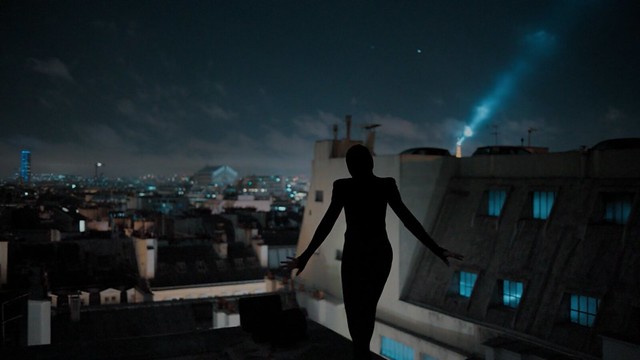 With the long form storytelling (as an 8-part HBO mini series), Olivier Assayas is allowed to develop and elaborate more from his Maggie Cheung starring 1996 film. As usual, fluidly infusing his life long obsessions, reflections on film history and compulsion to create, in order not to get lonely, Assayas creates light, airy and playful love letter to creative process.
With the long form storytelling (as an 8-part HBO mini series), Olivier Assayas is allowed to develop and elaborate more from his Maggie Cheung starring 1996 film. As usual, fluidly infusing his life long obsessions, reflections on film history and compulsion to create, in order not to get lonely, Assayas creates light, airy and playful love letter to creative process.
6. El Gran Movimiento - Russo
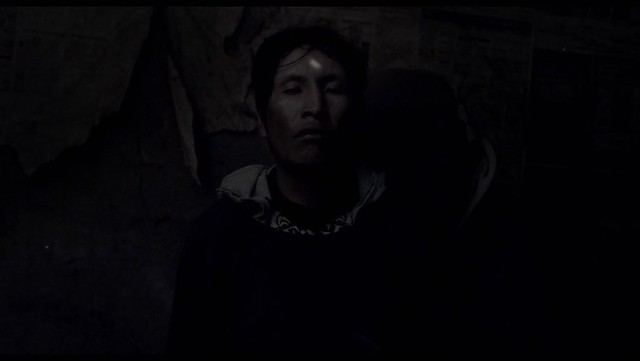 Much more inviting and personable than Koyaanisqatsi trilogy, melding of old and new, El Gran Movimiento is a stunning visual tone poem of the world in crisis complete with a dance number.
Much more inviting and personable than Koyaanisqatsi trilogy, melding of old and new, El Gran Movimiento is a stunning visual tone poem of the world in crisis complete with a dance number.
7. Hytti nro 6 - Kuosmanen
 Compartment No.6 has everything I love about cinema - Wanderlust, human connection, loneliness, trains, cold weather. Juho Kuosmanen, working from a novel by Rosa Liksom, finds a delicate balance in chiseling out beautiful moments of human connections without unnecessary backstories or dramatics. It's a little romance without all the fuss and stylings, but only warmth and silent mutual understanding.
Compartment No.6 has everything I love about cinema - Wanderlust, human connection, loneliness, trains, cold weather. Juho Kuosmanen, working from a novel by Rosa Liksom, finds a delicate balance in chiseling out beautiful moments of human connections without unnecessary backstories or dramatics. It's a little romance without all the fuss and stylings, but only warmth and silent mutual understanding.
8. Tár - Field
 Talking about gender equality in the face of sexual misconduct in the social media era, Todd Field's biting and grandiose character study Tár is at once current in its sexual politics and old fashioned in its rise and fall narrative of its subject. But Field really achieved something remarkable with Tár. It’s one of those big character driven film that is rare to be made nowadays. With its mesmerizing closeups and Blanchett’s commanding performance, the film is espetically spectacular on the big screen.
Talking about gender equality in the face of sexual misconduct in the social media era, Todd Field's biting and grandiose character study Tár is at once current in its sexual politics and old fashioned in its rise and fall narrative of its subject. But Field really achieved something remarkable with Tár. It’s one of those big character driven film that is rare to be made nowadays. With its mesmerizing closeups and Blanchett’s commanding performance, the film is espetically spectacular on the big screen.
9. Un beau martin - Hansen-Løve
 Mia Hansen-Løve does it again, so well, observing the time passing and melancholy of life. Seydoux and Gregory are both fantastic. This year's The Worst Person in the World without all the spunky enthusiasm.
Mia Hansen-Løve does it again, so well, observing the time passing and melancholy of life. Seydoux and Gregory are both fantastic. This year's The Worst Person in the World without all the spunky enthusiasm.
10. Nope - Peele
 Nope is actually very much like a Spike Lee joint, packed to the brim with ideas and messages, but in a simple, breatheable, cinematic symbolist way. It has little to do with character development or backstory or the classic structure. Things go haywire with unexpected twists and turns. Its references range from Roy Rogers, Close Encounters, Phenomena, 90s TV sitcoms, reality TV, tabloids, to Akira even, not to mention all the other clever pop culture references. It speaks volumes about the notions of the untamed west, nostalgia, colonization, captivity and spectacle. And the gaze: one of the many brilliant moments comes in when OJ understands not to look at the predator in the eye, like many traffic stops POC faces everyday. Loved the unconventional design of the entity as well as hilarious use of the air balloon modeled on Steven Yeun as a weapon. There are many more details I am forgetting to mention here.
Nope is actually very much like a Spike Lee joint, packed to the brim with ideas and messages, but in a simple, breatheable, cinematic symbolist way. It has little to do with character development or backstory or the classic structure. Things go haywire with unexpected twists and turns. Its references range from Roy Rogers, Close Encounters, Phenomena, 90s TV sitcoms, reality TV, tabloids, to Akira even, not to mention all the other clever pop culture references. It speaks volumes about the notions of the untamed west, nostalgia, colonization, captivity and spectacle. And the gaze: one of the many brilliant moments comes in when OJ understands not to look at the predator in the eye, like many traffic stops POC faces everyday. Loved the unconventional design of the entity as well as hilarious use of the air balloon modeled on Steven Yeun as a weapon. There are many more details I am forgetting to mention here.
11. Unrueh - Schäublin
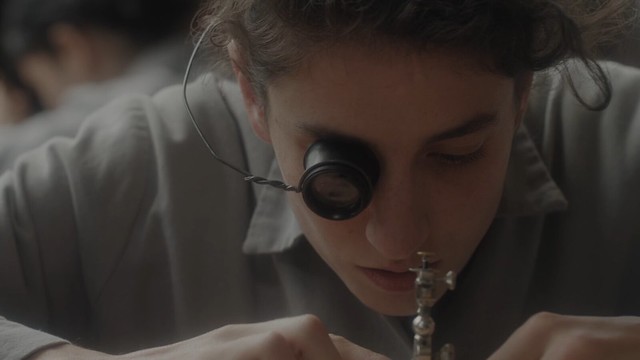 Cyril Schäublin sets up the two contrasting forces - capitalism fueled by industrial revolution versus collectivist agitation in his beguiling, the Swiss Jura mountains set period film, Unrest. It is a great allegory of the society we live in now, where commodifying time, as demonstrated by the news of instating permanent Daylight Savings time, as if we only exist to be productive at work. It advocates for the balance, and better yet, anarchy!
Cyril Schäublin sets up the two contrasting forces - capitalism fueled by industrial revolution versus collectivist agitation in his beguiling, the Swiss Jura mountains set period film, Unrest. It is a great allegory of the society we live in now, where commodifying time, as demonstrated by the news of instating permanent Daylight Savings time, as if we only exist to be productive at work. It advocates for the balance, and better yet, anarchy!
12. Geographies of Solitude - Mills
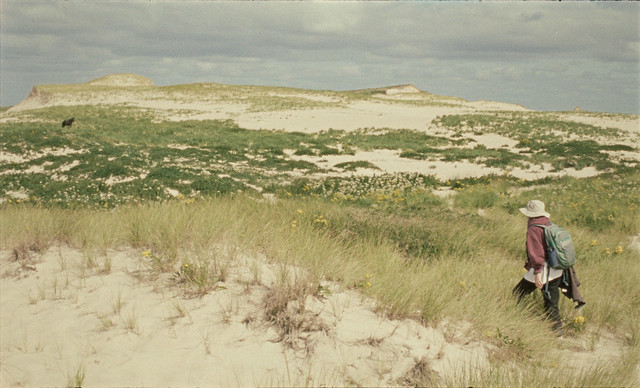 Filmmaker Jacquelyn Mills, in collaboration with Lucas, lovingly documents all that a windswept remote island can offer - sand dunes, horses, seals and insects, its intricate ecosystem. She also comments on the human footprints on environment through Lucas while capturing some of the most breathtakingly gorgeous images on 16mm film. It includes naturally exposed film stocks only by moonlight and hand printed footage using natural surroundings, like horse dung, sand, kelp and yarrow.
Filmmaker Jacquelyn Mills, in collaboration with Lucas, lovingly documents all that a windswept remote island can offer - sand dunes, horses, seals and insects, its intricate ecosystem. She also comments on the human footprints on environment through Lucas while capturing some of the most breathtakingly gorgeous images on 16mm film. It includes naturally exposed film stocks only by moonlight and hand printed footage using natural surroundings, like horse dung, sand, kelp and yarrow.
13. Crimes of the Future - Cronenberg
 Watching Crimes of the Future immediately reminded me of the famed painting by Rembrandt - The Anatomy Lesson of Dr. Nicolaes Tulp. The painter was commenting on the inadequacy of seeking knowledge and truth in the human body in the Age of Enlightenment. And this is the point Cronenberg has been making all his career- our futile quests for answers in what makes us humans, in our bodies which are the most personal, tangible things that each of us possesses, and not finding it there. And pursuing so hard to find something in all the blood and guts, you lose sight of whatever the humanity that's left in us. In a way, Cronenberg is going back to the basics - to the flesh after more cerebral musings in searching for the soul (Dangerous Methods, Cosmopolis).
Watching Crimes of the Future immediately reminded me of the famed painting by Rembrandt - The Anatomy Lesson of Dr. Nicolaes Tulp. The painter was commenting on the inadequacy of seeking knowledge and truth in the human body in the Age of Enlightenment. And this is the point Cronenberg has been making all his career- our futile quests for answers in what makes us humans, in our bodies which are the most personal, tangible things that each of us possesses, and not finding it there. And pursuing so hard to find something in all the blood and guts, you lose sight of whatever the humanity that's left in us. In a way, Cronenberg is going back to the basics - to the flesh after more cerebral musings in searching for the soul (Dangerous Methods, Cosmopolis).
14. A Night of Knowing Nothing - Kapadia
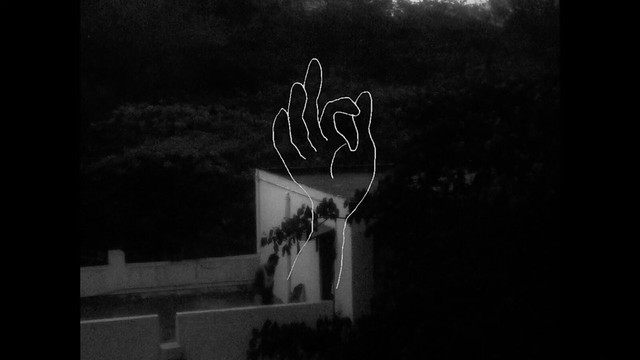 Memories fade, but nostalgia remains. From Godard and May 68', Mythical Hindu God films, to Chris Marker, A Night of Knowing Nothing weaves intoxicating visual, textural contemplation of our relationship with cinema as an unintentional but nevertheless undeniably nostalgic medium, even if the image is from only few years ago. Another beautiful contemplation of memories and what they mean to us I watched this year.
Memories fade, but nostalgia remains. From Godard and May 68', Mythical Hindu God films, to Chris Marker, A Night of Knowing Nothing weaves intoxicating visual, textural contemplation of our relationship with cinema as an unintentional but nevertheless undeniably nostalgic medium, even if the image is from only few years ago. Another beautiful contemplation of memories and what they mean to us I watched this year.
15. Serre Moi Fort - Amalric
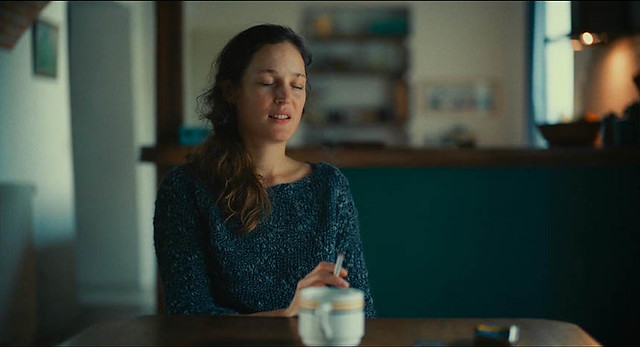 Vickey Krieps gives a gut-wrenching performance in a film about grieving and letting go that is so portent and heartfelt than any other film I've seen in a long time. Constantly going back and forth with her and her family, feeling the absence of one another yet articulating the connection in a very ingenious way, Amalric, adapting from Claudine Galea's play Je reviens de loin, makes perhaps the most heartfelt film as a writer/director. Give Krieps all the acting awards there are!
Vickey Krieps gives a gut-wrenching performance in a film about grieving and letting go that is so portent and heartfelt than any other film I've seen in a long time. Constantly going back and forth with her and her family, feeling the absence of one another yet articulating the connection in a very ingenious way, Amalric, adapting from Claudine Galea's play Je reviens de loin, makes perhaps the most heartfelt film as a writer/director. Give Krieps all the acting awards there are!
16. Das Mädchen und die Spinne - Zürcher
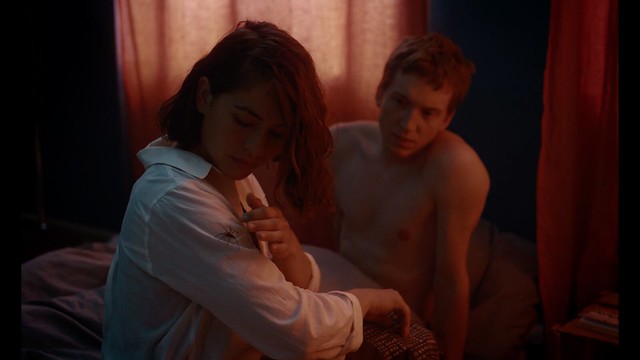 Mara, our static figure on the sidelines, is not immune to be the object of desire, as she gets attention from both sexes. Is she taking a break from the sinewy human connections because of the STD? Or is she somewhat autistic the way talented people are (she sketches gorgeous portraits of people around her). She is also capable of cruelty. Does the spider which gets passed on from Mara to others and back, signify a disease or desire or both? Twin siblings Ramon and Silvan Zürcher's second film, after enigmatic The Strange Little Cat (2013), is yet another chamber piece as a microcosm of people's inner yearning and desire to connect in the modern society. And The Girl and Spider is just as ambiguous and non-conclusive and formalist as the former, if not more so. And it's a delicious concoction.
Mara, our static figure on the sidelines, is not immune to be the object of desire, as she gets attention from both sexes. Is she taking a break from the sinewy human connections because of the STD? Or is she somewhat autistic the way talented people are (she sketches gorgeous portraits of people around her). She is also capable of cruelty. Does the spider which gets passed on from Mara to others and back, signify a disease or desire or both? Twin siblings Ramon and Silvan Zürcher's second film, after enigmatic The Strange Little Cat (2013), is yet another chamber piece as a microcosm of people's inner yearning and desire to connect in the modern society. And The Girl and Spider is just as ambiguous and non-conclusive and formalist as the former, if not more so. And it's a delicious concoction.
17. The Eternal Daughter - Hogg
 Using the Victorian Gothic trope, Joanna Hogg creates yet another meta-autofiction about her own complicated relationship with her mother. A family is the source for all your sorrows and joy and regret. After all, many of Victorian ghost stories are manifestation of repressed emotions and feelings. Swinton is glorious in a dual role in her white wig, pretty much carrying a conversation with herself. It is a subtly devastating performance - in many of the film's close-ups both as a mother and daughter, she conveys that nervousness of not trying to hurt one another, or in this case, herself, in that educated, polite British way. Hogg aces again.
Using the Victorian Gothic trope, Joanna Hogg creates yet another meta-autofiction about her own complicated relationship with her mother. A family is the source for all your sorrows and joy and regret. After all, many of Victorian ghost stories are manifestation of repressed emotions and feelings. Swinton is glorious in a dual role in her white wig, pretty much carrying a conversation with herself. It is a subtly devastating performance - in many of the film's close-ups both as a mother and daughter, she conveys that nervousness of not trying to hurt one another, or in this case, herself, in that educated, polite British way. Hogg aces again.
18. Avec amour et acharnement - Denis
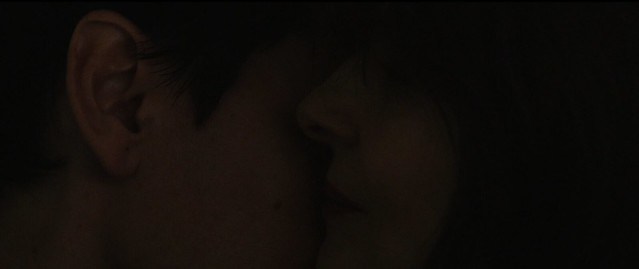 Shot during the pandemic, with her frequent collaborators, Claire Denis's moody chamber piece, Both Sides of the Blade, might be seen too wordy and conventional for the die-hard Denis acolytes who prefer her blissful visual filmmaking with colors and textures. But rest easy, because the film is nothing but. It contains enough visual/aural power and beauty, combined with blistering performances by Juliette Binoche and Vicent Lindon.
Shot during the pandemic, with her frequent collaborators, Claire Denis's moody chamber piece, Both Sides of the Blade, might be seen too wordy and conventional for the die-hard Denis acolytes who prefer her blissful visual filmmaking with colors and textures. But rest easy, because the film is nothing but. It contains enough visual/aural power and beauty, combined with blistering performances by Juliette Binoche and Vicent Lindon.
19. Ahed's Knee - Rapid
 It culminates to Y making Yahalom admitting that there is strong censorship within the art community in Israel, and deep down she knows it is wrong. Ahed's Knee directly confronts the well-intentioned liberals and criticises for their sheepishness and passivity. It's an angry film and shows its director's resourcefulness in saying what he has to say in the strongest terms (in the guise of making a fiction) while getting away from the grips of the censors while making a film within the country. Unflinching and direct in its message with kinetic visuals and breathless pacing, Ahed's Knee is another strong film from a talented filmmaker with strong point of view.
It culminates to Y making Yahalom admitting that there is strong censorship within the art community in Israel, and deep down she knows it is wrong. Ahed's Knee directly confronts the well-intentioned liberals and criticises for their sheepishness and passivity. It's an angry film and shows its director's resourcefulness in saying what he has to say in the strongest terms (in the guise of making a fiction) while getting away from the grips of the censors while making a film within the country. Unflinching and direct in its message with kinetic visuals and breathless pacing, Ahed's Knee is another strong film from a talented filmmaker with strong point of view.
20. Eo - Skolimowski
 The film, mostly shot from the donkey's point of view, with jarring close-ups, has a visceral, raw quality only seen in haptic cinema of Sensory Ethnography Lab (SEL). Unlike some cute Disney family movie starring a talking donkey, Eo is not a fairy tale. It can also be seen as sobering examination of the meat industry. But more importantly, it is an allegory for how people from different parts of the world, not by their own volition, get uprooted and go through unimaginable hardships and alienation only to be at the mercy of a handful of strangers who ultimately don't have any stake in their lives.
The film, mostly shot from the donkey's point of view, with jarring close-ups, has a visceral, raw quality only seen in haptic cinema of Sensory Ethnography Lab (SEL). Unlike some cute Disney family movie starring a talking donkey, Eo is not a fairy tale. It can also be seen as sobering examination of the meat industry. But more importantly, it is an allegory for how people from different parts of the world, not by their own volition, get uprooted and go through unimaginable hardships and alienation only to be at the mercy of a handful of strangers who ultimately don't have any stake in their lives.
21. The Novelist's Film - Hong
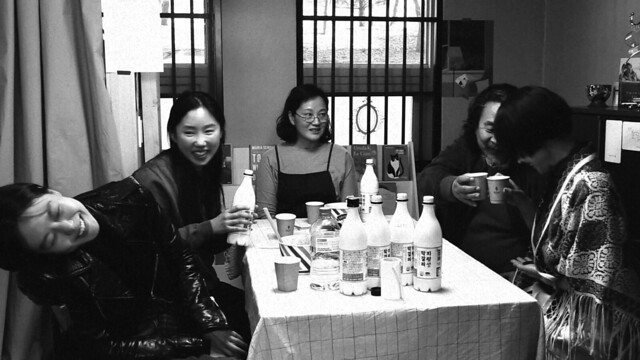 So goes another meta autofiction of Hong as he reveals sliver of his filmmaking process - 'compulsion' to make films in the director's earlier days are gone, giving way to stagnation, brought on by success, relative comfort and getting old. Story isn't as important. It can be as simple as something from the real life. Inspirations and directions can't be forced and life provides them in unexpected ways. With his consistent output, Hong's metaverse has become as comfortable as home for his fans. Watching his films is like meeting and conversing with an old friend now - they know you, you know them. But also, you start noticing small things, a delicate story within a story and small nuances in characters that you find pleasurable. The Novelist's Film is just that. And we find pleasure in many small details in the film.
So goes another meta autofiction of Hong as he reveals sliver of his filmmaking process - 'compulsion' to make films in the director's earlier days are gone, giving way to stagnation, brought on by success, relative comfort and getting old. Story isn't as important. It can be as simple as something from the real life. Inspirations and directions can't be forced and life provides them in unexpected ways. With his consistent output, Hong's metaverse has become as comfortable as home for his fans. Watching his films is like meeting and conversing with an old friend now - they know you, you know them. But also, you start noticing small things, a delicate story within a story and small nuances in characters that you find pleasurable. The Novelist's Film is just that. And we find pleasure in many small details in the film.
22. We're All Going to the World's Fair - Schoenbrun
 The main point of the movie is that in the internet discourse, no one knows one another, there is no distinguishing between what's real and what is not,that everyone has been circling around one another, for comfort, for lust, for real human connections, reaching out ever so timidly and endlessly without no tangible satisfaction. On a larger context, for the last two decades, this has been the case for millions of lonely souls. There has been some internet themed horror films in recent years, but none really concentrated on the alienation and performative aspects of the internet in a heartbreaking and poignant way Schoenbrun presents here.
The main point of the movie is that in the internet discourse, no one knows one another, there is no distinguishing between what's real and what is not,that everyone has been circling around one another, for comfort, for lust, for real human connections, reaching out ever so timidly and endlessly without no tangible satisfaction. On a larger context, for the last two decades, this has been the case for millions of lonely souls. There has been some internet themed horror films in recent years, but none really concentrated on the alienation and performative aspects of the internet in a heartbreaking and poignant way Schoenbrun presents here.
23. Saint Omer - Diop
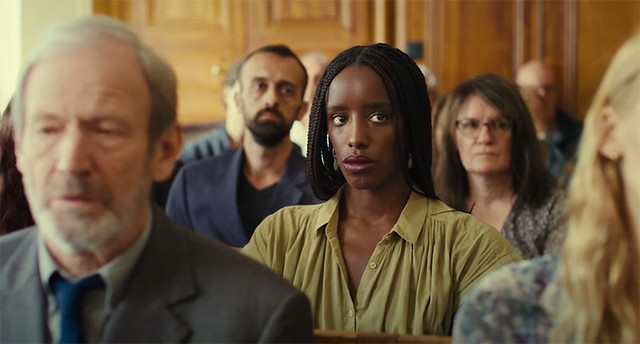 The film doesn't end with the verdict of the trial, but rather, ends with defense lawyer talking directly to the camera/audience and explaining the clinical term, a microchimera, an inter-change of cells between a fetus and its mother that goes both ways. That, in metaphorical sense, all women are chimeras, the mythic monster composed of different parts of the beast. Diop here is making a powerful statement, about the highly patriarchal society, colonialism, racism and women's rights, both subtly and unsubtly.
The film doesn't end with the verdict of the trial, but rather, ends with defense lawyer talking directly to the camera/audience and explaining the clinical term, a microchimera, an inter-change of cells between a fetus and its mother that goes both ways. That, in metaphorical sense, all women are chimeras, the mythic monster composed of different parts of the beast. Diop here is making a powerful statement, about the highly patriarchal society, colonialism, racism and women's rights, both subtly and unsubtly.
24. New Old Play - Qiu
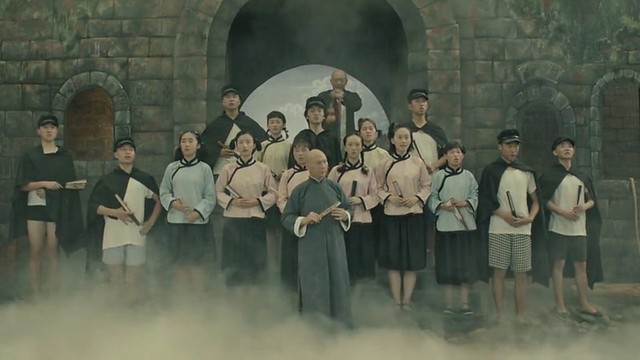 Spectacular handpainted sets and backdrops (production design done also by Qiu) and with simple but clever camera staging - slow dolly tracking and playing with deep focus, A New Old Play has in common with Roy Andersson's and Wes Anderson's cinema, if only aesthetically. Through its 3 hour runtime as these carefully orchestrated sets and movements settle you in to lived-in, comfortable feeling. And its Qiu's unbiased approach to Chinese history that gives melancholic resonance and wisdom being a witness to history on a personal level. Qiu hits home the idea of life being a stage, where we live and die on it.
Spectacular handpainted sets and backdrops (production design done also by Qiu) and with simple but clever camera staging - slow dolly tracking and playing with deep focus, A New Old Play has in common with Roy Andersson's and Wes Anderson's cinema, if only aesthetically. Through its 3 hour runtime as these carefully orchestrated sets and movements settle you in to lived-in, comfortable feeling. And its Qiu's unbiased approach to Chinese history that gives melancholic resonance and wisdom being a witness to history on a personal level. Qiu hits home the idea of life being a stage, where we live and die on it.
25. Trenque Lauquen - Citarella
 Trenque Lauquen plays out like a funnier, warmer and more intimate version of 'disappearance of woman' films a.k.a. L'Avventura, seen from a woman's perspective. Endlessly charming and entertaining, the film is very much like watching a Hong Sangsoo film without all the drinking; the intricacies of character interactions, the intrigue of every day life, the men's folly, the urge to escape the city living and enjoy nature. And most of all, freedom.
Trenque Lauquen plays out like a funnier, warmer and more intimate version of 'disappearance of woman' films a.k.a. L'Avventura, seen from a woman's perspective. Endlessly charming and entertaining, the film is very much like watching a Hong Sangsoo film without all the drinking; the intricacies of character interactions, the intrigue of every day life, the men's folly, the urge to escape the city living and enjoy nature. And most of all, freedom.
26. Mato seco em chamas - Pimenta, Queirós
 Pimenta and Queirós fluidly combines fictional elements with reality, highlighting the lives of people in Sol Nascente are often stranger than fiction. But it's the defiance and fierce independence and self-reliance that matter. The film ends with the wrecked armored car on fire, like a carcass of completely hollowed out animal in flames.
Pimenta and Queirós fluidly combines fictional elements with reality, highlighting the lives of people in Sol Nascente are often stranger than fiction. But it's the defiance and fierce independence and self-reliance that matter. The film ends with the wrecked armored car on fire, like a carcass of completely hollowed out animal in flames.
27. Showing Up - Reichardt
 Many films on art and art-making, the centerpiece is usually the art itself. In those films, we are reminded of the transformative power of art and the suffering the artists must endure to produce such sublime masterpieces that inspire us all. In Reichardt’s film the art itself is secondary. The perserverance of their creators is. Showing Up is emblematic of small pleasures we get from our creations that success doesn’t measure in fame and fortune. It’s self-satisfaction of showing up every day to your studio (or basement, or shed, or garage) and create.
Many films on art and art-making, the centerpiece is usually the art itself. In those films, we are reminded of the transformative power of art and the suffering the artists must endure to produce such sublime masterpieces that inspire us all. In Reichardt’s film the art itself is secondary. The perserverance of their creators is. Showing Up is emblematic of small pleasures we get from our creations that success doesn’t measure in fame and fortune. It’s self-satisfaction of showing up every day to your studio (or basement, or shed, or garage) and create.
28. Moonage Daydream - Morgan
 Morgen also uses Stan Brakage inspired animation of exploding primary colors to accompany the glorious music, punctuating the isolated beats and guitar riff that starts many of the Bowie's famed songs. More than anything, Moonage Daydream sounds and feels like a rousing concert documentary where one can't help but feeling emotional several times.
Morgen also uses Stan Brakage inspired animation of exploding primary colors to accompany the glorious music, punctuating the isolated beats and guitar riff that starts many of the Bowie's famed songs. More than anything, Moonage Daydream sounds and feels like a rousing concert documentary where one can't help but feeling emotional several times.
29. Rien à foutre - Lacoustre, Marre
 With verité style candid cinematography by Olivier Boonjing and Exarchopoulos's committed performance, Zero Fucks Given comments on hyper capitalist society where work and personal life exist like oil and vinegar, yet one dictates another whether we like it or not.
With verité style candid cinematography by Olivier Boonjing and Exarchopoulos's committed performance, Zero Fucks Given comments on hyper capitalist society where work and personal life exist like oil and vinegar, yet one dictates another whether we like it or not.
30. Hellraiser - Bruckner
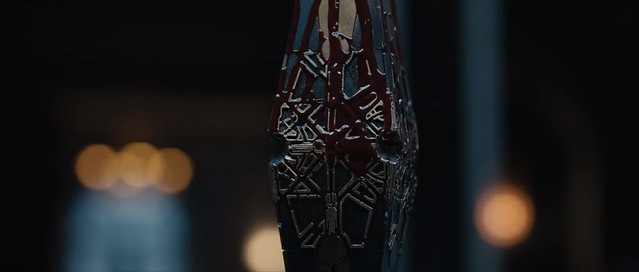 If the original Hellraiser film by Clive Barker was all about pleasures of flesh and dark human desires, this David Bruckner version equates cenobites with manifestations of the imaginings of a vulnerable mind and how it causes the sufferings of people around her. There has been a lot of emotional trauma horror films in recent years which I am not a big fan of, but Bruckner's Hellraiser is just gorgeous to look at.
If the original Hellraiser film by Clive Barker was all about pleasures of flesh and dark human desires, this David Bruckner version equates cenobites with manifestations of the imaginings of a vulnerable mind and how it causes the sufferings of people around her. There has been a lot of emotional trauma horror films in recent years which I am not a big fan of, but Bruckner's Hellraiser is just gorgeous to look at.
No comments:
Post a Comment